‘Mamá Cultiva’: the struggle of Argentinian women who grew cannabis for their sick children
Six years after the legalization of marijuana for medicinal use, its defenders fear that a change of government will roll back their hard-won rights
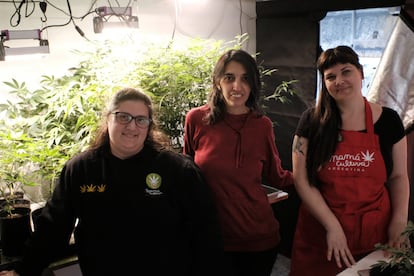
Valeria Salech heard her son laugh for the first time on the day she gave him cannabis oil. It was the result of endless bureaucracy. Valeria’s son Emiliano had not been able to obtain allopathic medication to treat refractory epilepsy, a disease that he suffered from since birth and that led him to suffer up to 200 seizures a day. “I heard him laugh, it was funny and emotional at the same time, but the first thing I thought was that I wanted to tell everyone what had happened,” she recalls. That day, Salech planted the seed of a network in Argentina of mothers dedicated to cultivating and producing marijuana to treat illnesses in their children for which conventional medicine provided an insufficient response or none at all.
Six years later and amid lingering prejudices about the cannabis plant and the judicial and police persecution of growers and consumers, Salech and a group of women created Mamá Cultiva. The organization was born in 2016 to fight, through legal means, for the right to plant and consume marijuana for medical purposes. The plant’s medicinal uses have been recognized by scientists worldwide thanks to the properties of cannabidiol (CBD), which can be used to treat a variety of diseases including epilepsy, Parkinson’s disease, and cancer. Although they changed Argentina’s law and were instrumental in getting a subsequent regulation that expands rights enacted, they now fear that, if the right-wing candidate Javier Milei is elected president in the November 19 run-off elections, their achievements will collapse, research will be paralyzed, and a legal framework that they benefit from will not be advanced.
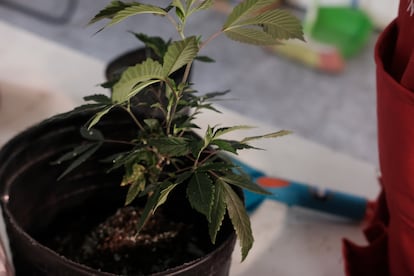
‘It’s magic’
Like Emiliano, thousands of people in Argentina turn to cannabis for non-allopathic treatments for diseases. Although in 2017 the Argentine Congress passed a law that regulates medical and scientific research and authorizes the import of CBD oil, it was not until November 2020 that the federal government regulated the law, and widened its base, since it allowed controlled self-cultivation through a registration with the Ministry of Health and the sale of oils, creams, and derivatives. According to official data, until mid-2023, there were 200,000 users registered on the National Registry of Persons Authorized to Grow Cannabis (Reprocann), including consumers and family members who provide care.
At the headquarters of Mamá Cultiva, located a few meters from Congress in the heart of Buenos Aires, the fragrance of carefully treated plants permeates the air, from the laboratory where they produce oils, creams, and ointments to a space where they give workshops to other women who arrive desperate after having visited one doctor’s office after another without finding a solution to their problem.
Unlike other women, Salech, 49, the president of Mamá Cultiva, was never prejudiced against marijuana. One day, in search of a solution for her son’s seizures, she came across a video of a woman in the United States who stopped her teenage daughter’s seizures with a few drops of cannabis oil rubbed on her gums. She immediately got in touch. It was 2009 and what would follow would be years of research and a life dedicated to the fight, which would lead her to change the law, take part in cannabis exhibitions, and travel to a conference of experts on marijuana use in the middle of the Brazilian jungle.
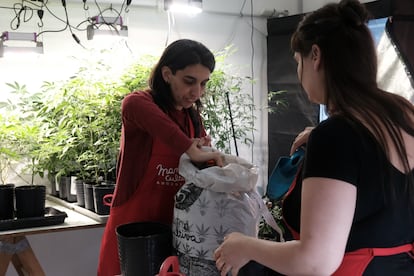
Yamila Peluso, 44, experienced a similar situation with her 12-year-old son Joaquín, who was diagnosed with autism spectrum disorder. “He couldn’t sleep or control his sphincters, he didn’t have friends at school, he got frustrated and became depressed. He told me: ‘I’m useless, I was born wrong.’ One day, my mother sent me a video of Valeria talking about cannabis,” she says. So, she had to break down her own prejudice. “I didn’t want to know anything, until a doctor recommended it to me.” Joaquín took the oil and that night, for the first time, he was able to sleep. “After a month he was talking, he wanted to play. Now we have a normal life, this has also improved our quality of life,” she says excitedly. Salech listens to her with an attentive gaze and summarizes: “It’s magical.”
It is common for people who suffer from autism to report an improvement in symptoms due to the therapeutic use of cannabis, and in some countries it is even recommended by doctors. However, at the moment there is not enough scientific evidence of its effects in these patients. Science has shown, however, that CBD is effective in the treatment of drug-resistant epilepsy and that it reduces the frequency of seizures, with life-changing results. A study by Argentine neuroscientist Silvia Kochen that was published in the journal Epilepsy & Behavior in 2023 also states that it is safe and that adverse effects are reduced. “For 70% of patients, it is a disease for which there is a cure that have no impact on cognitive ability, but 30% of patients who have epilepsy do not respond to medical treatment, despite the fact that there are 20 drugs, which leads to looking for alternatives,” Kochen said at an exhibition in 2022.
From stigma to prejudice
Julieta Molina, another member of Mamá Cultiva, explains that many other mothers were able to get information after the organization was set up. “We prepared workshops and 300 people came. Many even told us that they were waiting for us to bring out a drum of oil to distribute,” adds Salech, laughing.
For Molina, approaching Mamá Cultiva was essential. Her son Pedro was born and a few days later he began to have imperceptible involuntary movements. “At the medical check-up they underestimated me, they said it was common,” she says. Then she came across a neurologist who first introduced her to cannabis as an alternative. By then, her baby was having frequent seizures. “I had the stigma, because until then I had used marijuana recreationally,” she says. For this reason, she started smoking cannabis: “I gave him the cannabinoids through his breast milk and he stopped convulsing. The doctors said [the treatment] wasn’t in the medical books.”
“It's not going to cure them,” Julieta continues. “Our children are not going to be neurotypical, but we can afford something that improves their quality of life and makes them happy.”
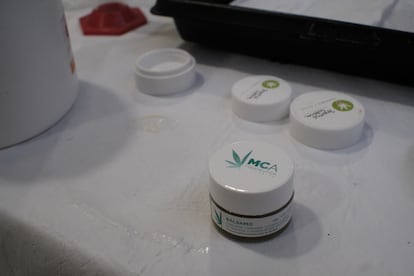
The fear of losing hard-won rights
Although she warns that the law passed in 2017 was positive, the president of Mamá Cultiva clarifies that it is not what they would have wanted, because it barely recognizes the plant’s therapeutic qualities and makes almost no recommendation that further research should be encouraged. However, they clarify that the government regulations decreed in 2020 “widen” the law, by allowing not only the sale of oils, but also including a very broad comprehensive concept of health, which includes physical, psychological, and social health. With this perspective, the standard allows self-cultivation for users, patients, and researchers who sign up to a registry, without discrimination based on specific diseases or pathologies. In addition, it allows marijuana to be transported, something that is prohibited by current drug laws. “It enables us to have cannabis in our purse,” Salech said.
In any case, Salech, Peluso, and Molina fear a reduction in hard-won rights that will lead to persecution in the event of a possible change in political direction by the Argentine government. “Right-wing gains in the country put us at risk, and that means putting our children at risk. It would stigmatize us again and send us back into hiding,” Salech emphasizes. She fears the arrival of Javier Milei at the Casa Rosada. The ultra candidate came second in the Argentine presidential elections, and during the campaign promised to close the National Council of Scientific and Technical Research (Conicet), where dozens of projects linked to cannabis for medical purposes are being carried out.
In 2021, when asked about the eventual legalization of cannabis, he stated: “If the human being who decides to consume marijuana is responsible for the bill, I have no problem.” The Peronist candidate Sergio Massa, who received the most votes in the last elections, was in favor of regulation, not only for medical purposes, but also for productive purposes. As Minister of Economy, he launched the National Cannabis Agency this year, with the aim of advancing the creation of a cannabis industry that in its first stage could create 5,000 jobs in the production of textiles and cosmetics.
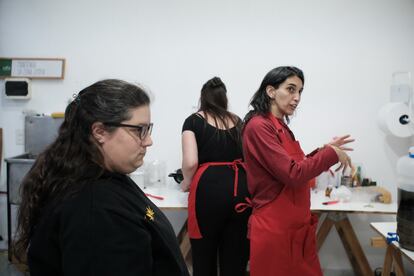
Reap the fruit of the struggle and new challenges
Eight years after the creation of Mamá Cultiva, Salech is committed to expanding rights, not only for young children, but also for the women in charge of their care. “Today we are approached by many adults who are not mothers but have illnesses of all kinds and the most important thing is to listen to them because they have no one else,” says Yamila.
The organization also holds workshops and coordinates with universities that offer specialized courses in cannabis, while producing oils, creams, and ointments to finance them.
“The plant came to us because there was growing resistance to the prohibition that had been maintained robustly throughout Argentine history. There were people who became professionals and put their heart and soul into it, and they avoided the stigma and being arrested,” recalls Salech. Focused, but with a smile on her face, the president of Mamá Cultiva looks over the plants one by one that are neatly illuminated and imbue the atmosphere with citrus aroma. “We are better mothers with marijuana,” she says.
Sign up for our weekly newsletter to get more English-language news coverage from EL PAÍS USA Edition
Tu suscripción se está usando en otro dispositivo
¿Quieres añadir otro usuario a tu suscripción?
Si continúas leyendo en este dispositivo, no se podrá leer en el otro.
FlechaTu suscripción se está usando en otro dispositivo y solo puedes acceder a EL PAÍS desde un dispositivo a la vez.
Si quieres compartir tu cuenta, cambia tu suscripción a la modalidad Premium, así podrás añadir otro usuario. Cada uno accederá con su propia cuenta de email, lo que os permitirá personalizar vuestra experiencia en EL PAÍS.
¿Tienes una suscripción de empresa? Accede aquí para contratar más cuentas.
En el caso de no saber quién está usando tu cuenta, te recomendamos cambiar tu contraseña aquí.
Si decides continuar compartiendo tu cuenta, este mensaje se mostrará en tu dispositivo y en el de la otra persona que está usando tu cuenta de forma indefinida, afectando a tu experiencia de lectura. Puedes consultar aquí los términos y condiciones de la suscripción digital.








































